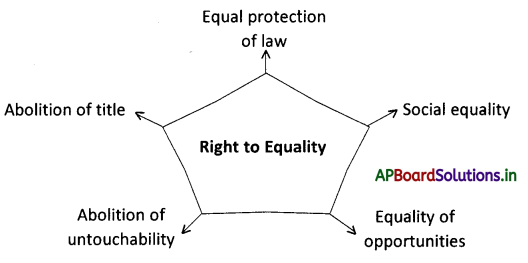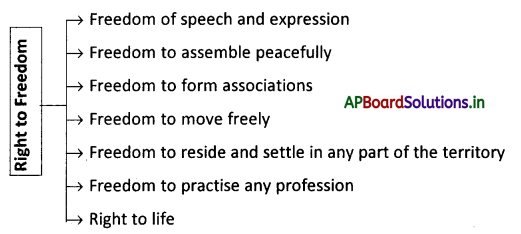Students can go through AP State Board 9th Class Social Studies Notes Chapter 21 Human Rights and Fundamental Rights to understand and remember the concept easily.
AP State Board Syllabus 9th Class Social Studies Notes Chapter 21 Human Rights and Fundamental Rights
→ Rights are reasonable claims of persons. These claims are protected by law.
→ Rights become significant in the context of democratic systems.
→ Democracy safeguards not just the majority but also the minorities.
→ The UDHR is a document to which many of the modern states are signatory too implying that they will uphold all the basic human rights mentioned there.
→ Fundamental Rights find a place in Part 3 of the Constitution of India.
→ A writ is an authority given to the court to issue directions to the government to protect and enforce any constitutional right.
→ The Constitution says that the government “shall not deny to any person equality before the law or equal protection of the laws.”
→ The State shall not discriminate against any citizen on grounds only of religion, race, caste, sex, and place of birth, or any of them.
→ The Constitution guarantees equality of opportunity for all citizens in matters relating to employment or appointment to any office under the state.
![]()
→ NHRC is vested with the authority to make an inquiry, Suo Motu (on its own initiative), or on a petition presented to it by a victim or any person on his / her behalf.
→ People have the right to come together or assemble for many reasons such as to hold meetings about their rights, to discuss their problems or business, to exchange ideas and share views, etc.
→ In 2002, the right to primary education became a part of the right to life.
→ The Constitution states, “no child below the age of 14 shall be employed to work in any factory or mines or engaged in any other hazardous employment”
→ According to the Constitution, the government does not have any religion.
→ To make fundamental rights meaningful to everybody the courts under the exercise of judicial review have encouraged the people to file Public Interest Litigation or PIL.
→ The Fundamental Rights provided in Constitution have been amended from time to time.
→ The Universal Declaration of human rights was passed by the UN GeneralAssembly in 1948.
![]()
→ In 1993, the Government of India passed an act of the legislature to protect human rights.


